| |
 . . |
|
Delegates
in the ECOSOC chamber during the morning session
|
| General Statements on the Secretary-general's report on Protection
of the Atmosphere |
 JoAnne
DiSano, Director, Division for Sustainable Development,
introduced the Secretary-general's report on Protection of the Atmosphere
(E/CN.17/2001/2). She said the report addresses matters relating
to atmosphere protection and climate, including vulnerability, adaptation
and human health impacts, and highlighted the overarching issues,
including capacity building, education and training and public awareness.
JoAnne
DiSano, Director, Division for Sustainable Development,
introduced the Secretary-general's report on Protection of the Atmosphere
(E/CN.17/2001/2). She said the report addresses matters relating
to atmosphere protection and climate, including vulnerability, adaptation
and human health impacts, and highlighted the overarching issues,
including capacity building, education and training and public awareness.
|
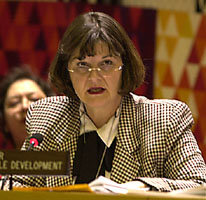
|
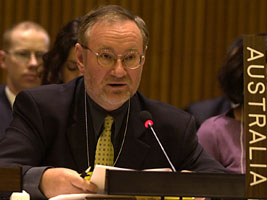 |
 Australia
commented that work accomplished
in other fora should not be duplicated. He supported a collaborative
approach to addressing air quality in urban areas, including fine
particular matter emitted by the transport sector and air toxins.
He noted national efforts toward implementation of domestic greenhouse
reduction programmes. He said climate variability must be considered
as a stand-alone sustainability issue and supported improvement of
the geographic coverage of the Global Climate Observing System.
Australia
commented that work accomplished
in other fora should not be duplicated. He supported a collaborative
approach to addressing air quality in urban areas, including fine
particular matter emitted by the transport sector and air toxins.
He noted national efforts toward implementation of domestic greenhouse
reduction programmes. He said climate variability must be considered
as a stand-alone sustainability issue and supported improvement of
the geographic coverage of the Global Climate Observing System. |
|
 Iran,
for the G-77/China, cautioned against preempting the outcomes
of COP-6 of the UNFCCC COP-6. He stressed the need for: additional
resources to the Multilateral Fund for the further implementation
of the Montreal Protocol and its Annexes; development of affordable
and adaptable alternatives to non-ozone depleting substances (ODS)
for developing country use; leadership by developed countries in
addressing pollution within common but differentiated responsibilities;
and holistic and comprehensive approaches to atmospheric protection.
He called on CSD-9 to, inter alia: address financial, technological
and institutional barriers to combating air pollution in developing
countries; encourage regional cooperation in addressing air pollution;
and call on the IPCC to support active and more proportionate involvement
of developing country experts.
Iran,
for the G-77/China, cautioned against preempting the outcomes
of COP-6 of the UNFCCC COP-6. He stressed the need for: additional
resources to the Multilateral Fund for the further implementation
of the Montreal Protocol and its Annexes; development of affordable
and adaptable alternatives to non-ozone depleting substances (ODS)
for developing country use; leadership by developed countries in
addressing pollution within common but differentiated responsibilities;
and holistic and comprehensive approaches to atmospheric protection.
He called on CSD-9 to, inter alia: address financial, technological
and institutional barriers to combating air pollution in developing
countries; encourage regional cooperation in addressing air pollution;
and call on the IPCC to support active and more proportionate involvement
of developing country experts.
|

|
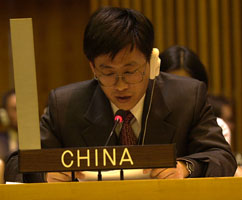 |
 China
said developed
countries must realize in good faith their objectives under the
Montreal Protocol and that the IPCC should remain unbiased. He said
decreased multilateral financial support has created a need for
subsidies. He stressed the importance of transboundary movement
of emissions and said space-based observation must not come at a
detriment of land-based observation.
China
said developed
countries must realize in good faith their objectives under the
Montreal Protocol and that the IPCC should remain unbiased. He said
decreased multilateral financial support has created a need for
subsidies. He stressed the importance of transboundary movement
of emissions and said space-based observation must not come at a
detriment of land-based observation.
|
 Sweden,
on behalf of the EU, supported, inter alia: international
action and cooperation in efforts to reduce emissions; selecting
measures on transboundary air pollution that achieve multiple
goals; preventing the introduction of ozone depleting substances
not yet covered by international regulations; and focusing on
air pollutants and their mitigation, so as not to preempt UNFCCC
COP-6 outcomes.
Sweden,
on behalf of the EU, supported, inter alia: international
action and cooperation in efforts to reduce emissions; selecting
measures on transboundary air pollution that achieve multiple
goals; preventing the introduction of ozone depleting substances
not yet covered by international regulations; and focusing on
air pollutants and their mitigation, so as not to preempt UNFCCC
COP-6 outcomes.
|
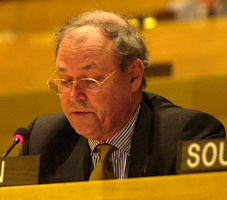
|
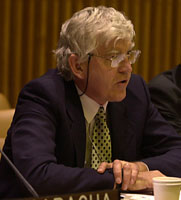 |
 New
Zealand invited
the Secretary-general's report to support all critical ground-based
measurement programmes. He supported research on vulnerability,
resilience and adaptive capacity and dissemination of information
and understanding of climate change issues through capacity building
and specialist material.
New
Zealand invited
the Secretary-general's report to support all critical ground-based
measurement programmes. He supported research on vulnerability,
resilience and adaptive capacity and dissemination of information
and understanding of climate change issues through capacity building
and specialist material. |
 Canada
called for, inter alia: resources to enable developing countries
to eliminate and reduce persistent organic pollutants; collaboration
with industry and other organizations in raising awareness; and
technology access.
Canada
called for, inter alia: resources to enable developing countries
to eliminate and reduce persistent organic pollutants; collaboration
with industry and other organizations in raising awareness; and
technology access. |
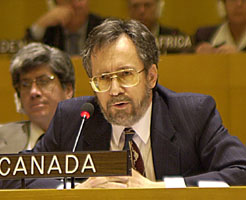
|
|
|
 Cuba
called for greater synergy
between the Montreal Protocol and conventions on Biological Diversity,
Climate Change and Desertification, noting that they are interlinked
and could give joint results.
Cuba
called for greater synergy
between the Montreal Protocol and conventions on Biological Diversity,
Climate Change and Desertification, noting that they are interlinked
and could give joint results.
|
 Switzerland
stressed issues
such as the timely implementation of the Montreal Protocol and other
agreements on atmosphere protection. He said the UNFCCC COP is the
only competent negotiating forum for climate change.
Switzerland
stressed issues
such as the timely implementation of the Montreal Protocol and other
agreements on atmosphere protection. He said the UNFCCC COP is the
only competent negotiating forum for climate change. |
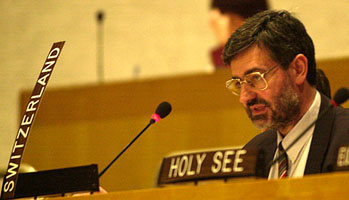 |
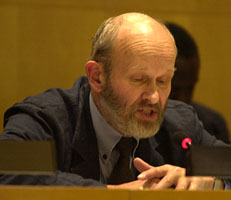 |
 Norway
called
for a focus on the prevention, rather than the cure, of atmospheric
pollution, and highlighted, inter alia, public participation
and standards.
Norway
called
for a focus on the prevention, rather than the cure, of atmospheric
pollution, and highlighted, inter alia, public participation
and standards. |
 The
NGO Energy and Climate Change Caucus said that if all the
loopholes in the Kyoto Protocol were eliminated, an important 5
percent reduction would be achieved, which would still be insufficient.
She outlined elements for a global action plan to achieve sustainable
energy policies including: removing harmful subsidies; redirecting
funding to conservation and sustainable energy; establishing and
supporting an international sustainable energy organization; supporting
full cost accounting in all energy policy and pricing decisions;
and supporting targets, timeframes and cooperation in achieving
objectives.
The
NGO Energy and Climate Change Caucus said that if all the
loopholes in the Kyoto Protocol were eliminated, an important 5
percent reduction would be achieved, which would still be insufficient.
She outlined elements for a global action plan to achieve sustainable
energy policies including: removing harmful subsidies; redirecting
funding to conservation and sustainable energy; establishing and
supporting an international sustainable energy organization; supporting
full cost accounting in all energy policy and pricing decisions;
and supporting targets, timeframes and cooperation in achieving
objectives. |
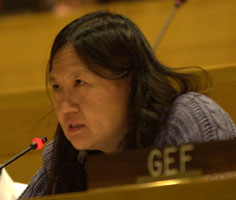 |
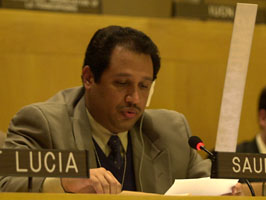 |
 Saudi
Arabia opposed
preempting the outcomes of COP-6, and opposed the development of
a cooperative mechanism to establish a legal framework to prevent
transboundary haze, which he said would be premature.
Saudi
Arabia opposed
preempting the outcomes of COP-6, and opposed the development of
a cooperative mechanism to establish a legal framework to prevent
transboundary haze, which he said would be premature. |
|
The
US delegation meets with NGOs to discuss expected outcomes
on transport and atmosphere.
|
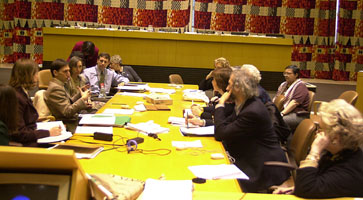 |
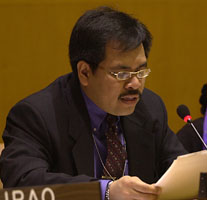 |
Indonesia noted that unsustainable consumption patterns and
the transport sector in developed countries are responsible for
emissions. He highlighted: addressing the detrimental impacts of
the changing atmospheric composition; improving the scientific basis
for decision-making; and raising the awareness of all segments of
society on the effects of ozone depletion. He called for action
to reduce the detrimental effects of Ozone Depleting Substances
that are already trapped in the atmosphere and to control regional
transboundary air pollution.
|
| Comments on possible elements for the Draft Decision on Transport |
The document
on possible elements for the Draft Decision on Transport includes
sections on general considerations, international cooperation,
regional cooperation, and recommendations at the national level.
Photo:
Co-Chair Stuart with the Australian delegation
|
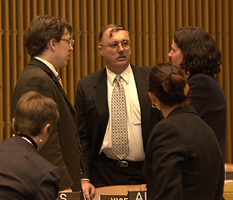
|
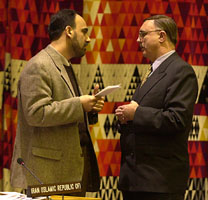
Iran (left)
with CO-Chair Stuart
On
general considerations to be included in the draft decision, Iran,
for the G-77/China, suggested adding text on: compliance with
international law and agreements in the movement of nuclear waste;
affordability and accessibility of transport services and systems
to ensure mobility on equitable basis to all sectors of society
is instrumental to sustainable development; and on tackling transport-related
environmental impacts requires capacity building, technology transfer
and provision of new and additional financial resources, particularly
to developing countries. With respect to challenges from multiple
stakeholders, the G-77/China preferred stating that dialogue is
encouraged, rather than "increasingly accepted as a pre-condition
for effective action by governments." With regard to the three general
considerations on the Programme for the Further Implementation of
Agenda 21, the UNFCCC and Kyoto Protocol, and the Global Plan of
Action on Human Settlements, he preferred deleting references to
the UNFCCC and Kyoto Protocol to avoid being selective.
|
|
Jose
Romero (Switzerland) speaking with an NGO.
|
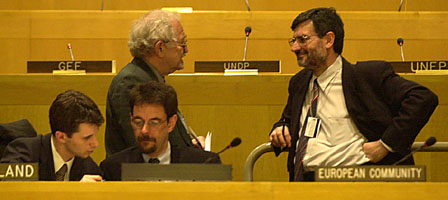 |
| Elaborating
the importance of transport to mountainous regions, Kyrgyzstan, with
Switzerland, suggested language on ensuring such regions benefit
from transport and infrastructure development, the implementation
of development projects, as well as construction, maintenance and
modernization of transport infrastructure and cooperation with international
organizations and the private sector. Switzerland also reiterated
the internalization of external costs and the polluter-pays-principle.
He proposed a paragraph emphasizing, inter alia, that progress in
approaches to sustainable mobility depends on technological processes.
|
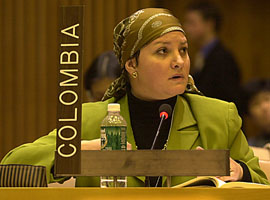 |
Colombia,
with Chile, Guyana and Saudi Arabia,
proposed a paragraph stating that limitations and loopholes exist
in the international environmental regime regarding the transboundary
movement of nuclear wastes and their disposal, and that further work
in this area should include, inter alia, the conclusion of a legally
binding instrument. The Russian Federation, with Canada, Japan
and the US, objected, stating that the issue has been covered
in other areas of the document and that any approach to transboundary
movement should be more general. |
|
RELATED
LINKS
Past
IISD Coverage:
|
|



